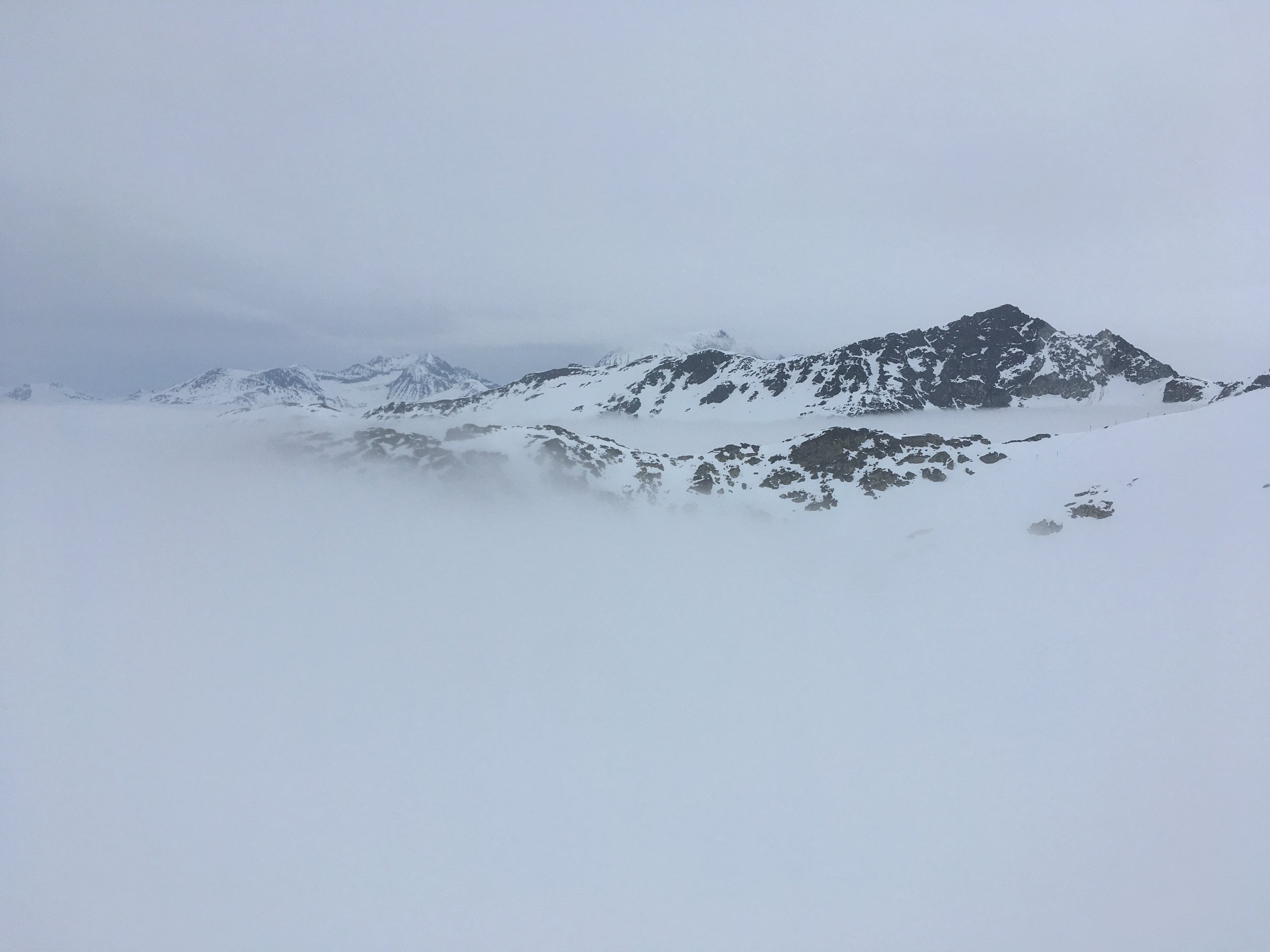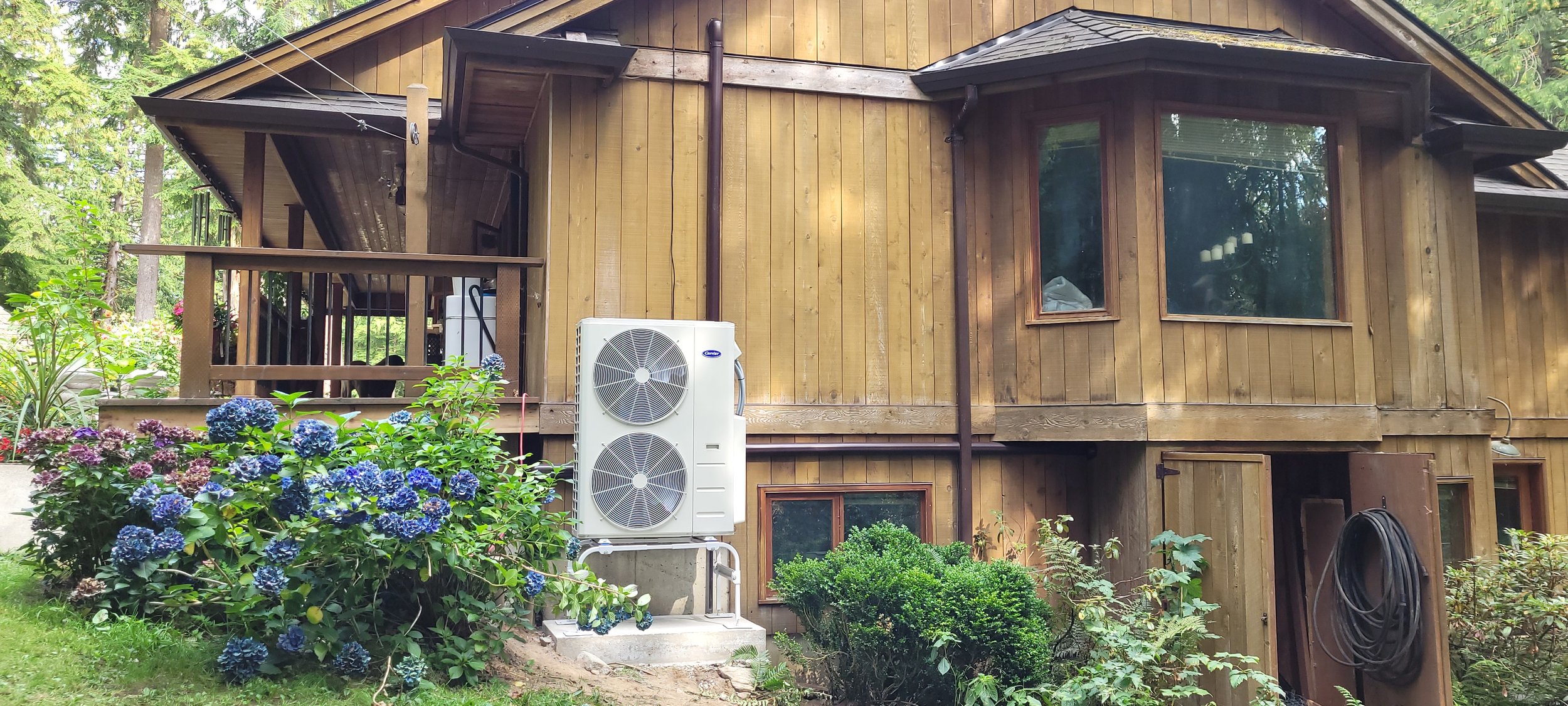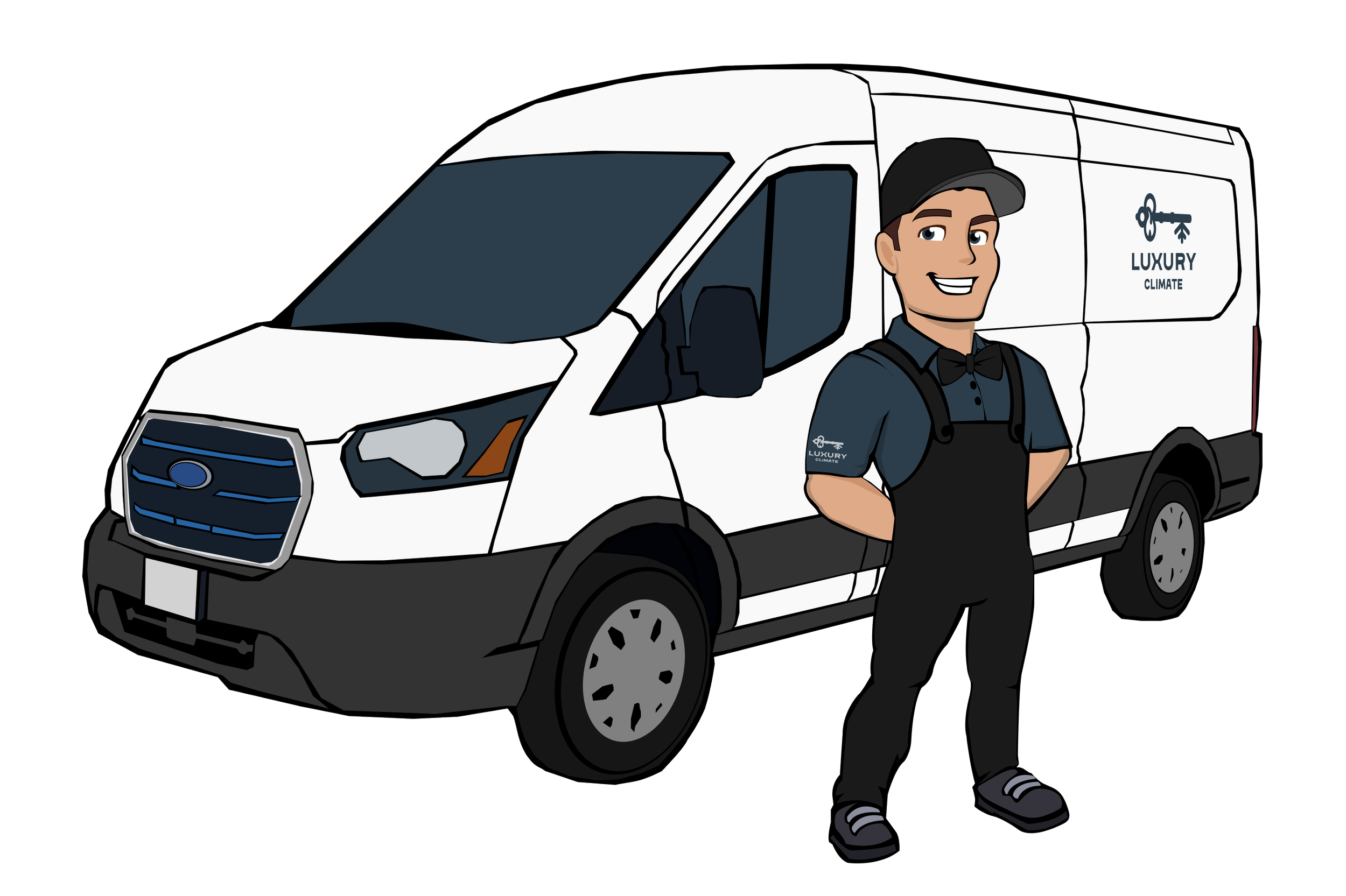
More Information About Heat Pumps
Do you have questions about how heat pumps work? What options are available? How do we choose the correct heat pump for your home? What are a balance point and supplemental heat?
If you cannot find the answers to your questions here, check out our TIPS & FAQ page, or contact us!
What You Will Find Here
Will heat pumps work in Fraser Valley?
How do heat pumps work?
Will a heat pump work for my home?
How do I know what size system my home will need?
Contact Luxury Climate
Will heat pumps work in Fraser Valley?
Heat pumps are a proven technology used for decades in Canada and globally to provide homes with heating, cooling, and hot water. Some heat pumps available today are rated to operate in temperatures past -30°C, making them an excellent solution for our homes in the Fraser Valley. With the versatile products available, there are solutions for every home. Whether you currently heat your home with a furnace and ductwork, electric baseboard, in-floor hydronic heat, or anything else, there is a heat pump solution we can design to fit your needs.
How do heat pumps work?
Heat pump systems transfer heat from one location to another using a small amount of energy. They work on the principle of moving heat rather than generating it through combustion or electrical resistance. Here's how they typically work:
Evaporation: A refrigerant, typically a fluid with a low boiling point, is pumped through a loop with an evaporator coil. In the evaporator coil, the refrigerant absorbs heat from the surrounding air or water, causing it to evaporate and turn into a gas.
Compression: The gas refrigerant is then compressed by a compressor, which increases its temperature and pressure. This compression process also increases the energy level of the refrigerant.
Condensation: The hot, pressurized gas then moves to a condenser coil, releasing its heat to the surrounding air or water. As the heat is released, the refrigerant condenses back into a liquid.
Expansion: After the heat is released, the liquid refrigerant passes through an expansion valve, where its pressure and temperature are reduced. This prepares the refrigerant to re-enter the evaporator coil and start the cycle.
By continuously circulating refrigerant through this cycle, a heat pump can extract heat from a cold space (like the outside air in winter) and transfer it indoors to heat a building, or it can remove heat from indoors and release it outside (like in summer for cooling). Additionally, heat pumps can be air-source, absorbing and releasing heat to and from the air, or ground-source (geothermal), which exchange heat with the ground.
Will a heat pump work for my home?
Heat pumps can replace any existing heating system, including oil or gas furnaces, electric baseboards, boilers, and more. Even though heat pumps are versatile and can be retrofitted to any home, some factors could increase costs and make them more challenging for some homeowners to install. If you will invest in your home to make it more energy efficient, we always recommend taking the house-as-a-system (HAAS) approach. This means that all components of your house, including insulation, windows, doors, air sealing, and HVAC, all act as one. If your home is old and drafty, we recommend improving insulation and air tightness before replacing your HVAC system. If your boat had a hole, would you plug it first or install a bigger bilge pump?
Luxury Climate offers free consultations to assess your home’s heating and cooling needs and discuss whether a heat pump suits you. We can provide recommendations tailored to your situation and help you make an informed decision.
Home Size and Layout: The size and layout of your home influence the type and size of the heat pump you need. Larger homes may require more powerful heat pumps, while the design of your home can affect the distribution of heated or cooled air. Ductless mini-split heat pumps can be a good option for homes without existing ductwork or for room-by-room temperature control. Luxury Climate will confirm its ability to quietly distribute the required air for your new system if you use existing ductwork. A heat loss and gain should be completed to determine the system size.
Insulation and Energy Efficiency: The insulation, air sealing, and outside conditions of your home also impact the effectiveness of a heat pump. A well-insulated and sealed home with energy-efficient windows and doors will retain heat better in winter and keep heat out during summer. Making a home more energy efficient in the Fraser Valley typically brings your heating and cooling loads closer to the same amount. The benefit of this is your contractor will be able to provide you with a heat pump that isn’t undersized for heating or oversized for cooling. If your heat pump is undersized for heating, you will rely more on your supplemental heat system. If it is oversized for cooling, your system may short cycle and cause humidity and mold issues.
Installation costs: Heat pumps can be more energy-efficient than traditional heating and cooling systems, but they can also have higher upfront costs, especially for installation. However, over time, the energy savings may offset the initial investment. Additionally, incentives, rebates, or tax credits may be available for installing energy-efficient heating and cooling systems.
Electrical Requirements: When adding large electrical loads to your home, your contractor should determine if your current electrical service can handle it or if you need a service upgrade.
Noise Considerations: Some heat pumps, especially outdoor units, can produce noise during operation. Consider whether noise from the heat pump might be a concern, mainly if it's located near bedrooms or outdoor living areas. Most customers find that their new heat pump system operates quieter than their old furnace most days of the year. They are noisiest on the coldest days of the year when they have to run at their highest speed and also go into defrost.
How do I know what size system my home will need?
Rules of thumb and estimations, such as “30 BTU/sq ft for heating” and “1 ton/800 sq ft for cooling,” are poor choices when designing a heat pump system. A system should never be sized based on square footage alone.
Here is an example of two homes in Agassiz with similar square footage that Luxury Climate completed heat loss and heat gain calculations on:
Home A: Rancher home built in 2005, 1979 sq ft, has a heat load of 44,663 BTUH
Home B: A townhouse built in 2010, 1833 sq ft, has a heat load of 18,322 BTUH
These two homes, which are close to the same square footage and built around the same time, have drastically different heating requirements. The rule of thumb of 30 btu/sq ft would have resulted in home A being oversized by 33% and home B being oversized by 300%!
The only way to correctly size a heating and cooling system for a home is by getting a professional heat gain and heat loss calculation. Luxury Climate is certified by HRAI to perform F280-12 heat loss and gain calculations. Since we are certified for design and installation, this saves time on communication, makes design changes easier, and results in a more effective HVAC system.
Some of the things that will affect the heating and cooling requirements of a house are:
Exposed walls: Area of walls exposed to unconditioned (outdoor) space
Insulation: Increased insulation slows down heat transfer between conditioned and unconditioned space
Windows and doors: Low-E coatings on windows, drapes, blinds, shaded or in direct sunlight, the direction they are facing, overhangs, insulation values
Air tightness: A well-sealed house reduces air transfer between indoors and outdoors
Climate: The outdoor conditions where the house is built. This includes temperature, humidity, wind, and more
Orientation: What side of the home the sun shines on
Soil conditions: If the home has a basement or it is slab on grade, is the ground generally wet or dry

TIPS & FAQ
Looking for tips? Have questions? Check out our TIPS & FAQ page!
Luxury Climate
Discover locally owned and operated heating and cooling services in Agassiz, BC, proudly serving Chilliwack, Abbotsford, Hope, and Mission areas. Luxury Climate specializes in premium American Standard unitary equipment installations. We also offer a range of top brands for mini-split and multi-split systems, including Mitsubishi, Fujitsu, Daikin, Tosot, and Moovair.
Our team comprises Red Seal Certified, factory-trained, licensed, and insured technicians with extensive experience in tackling the unique climate challenges of the Fraser Valley. Backed by decades of expertise, we ensure top-notch service quality.
At Luxury Climate, we prioritize excellence, offering industry-leading wages, benefits, and continuous training for our team through UA Local 516. Experience the difference with our dedicated professionals, committed to providing superior heating and cooling solutions tailored to your needs.





